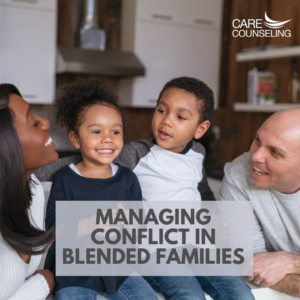Managing Conflict in Blended Families
 Blended families, consisting of stepparents, stepsiblings, and biological children, have become increasingly common today. While they offer the opportunity to create new bonds and shared experiences, blending families also brings its own set of unique challenges, including managing conflict.
Blended families, consisting of stepparents, stepsiblings, and biological children, have become increasingly common today. While they offer the opportunity to create new bonds and shared experiences, blending families also brings its own set of unique challenges, including managing conflict.
- Open Communication is Key
Effective communication is at the heart of managing conflict in blended families. Encourage open dialogue, making it clear that every family member’s thought and feeling are valued. Create a safe space where everyone can express themselves without fear of judgment.
- Set Realistic Expectations
Understanding that blending a family is a process that takes time can help set realistic expectations. Unrealistic expectations can lead to disappointment and frustration. Be patient with the adjustment period, and remember that it’s normal for conflicts to arise during this transition.
- Create New Traditions
Blending families often involve merging different traditions, routines, and lifestyles. Create new family traditions and rituals that everyone can participate in. This helps build a sense of togetherness and shared experiences, reducing potential conflicts.
- Acknowledge and Address Emotions
Recognize and acknowledge the emotions that family members may be experiencing during the blending process. Emotions such as insecurity, jealousy, or anger can be common, and addressing them openly can help family members work through their feelings.
- Promote Quality One-on-One Time
In addition to spending time together as a blended family, encourage one-on-one time between parents and children, and among siblings. This individual attention helps family members develop and maintain strong bonds with each other.
- Seek Professional Help When Needed
If conflicts within the blended family become unmanageable, it may be beneficial to seek the guidance of a family therapist or counselor. They can provide tools and strategies for resolving conflicts and improving family dynamics.
- Foster Mutual Respect
Emphasize the importance of mutual respect within the blended family. Family members should treat each other with kindness, empathy, and consideration. Discuss the values of respect and appreciation for one another.
- Address Parenting Styles
One common source of conflict in blended families is differing parenting styles. Parents should openly discuss their approaches to parenting and work to find common ground. Consistency in discipline and parenting practices can help reduce tension.
- Encourage Flexibility
Flexibility is essential in blended families. Be willing to adapt to changing situations, such as custody arrangements and schedules. Flexibility can help reduce conflicts and create a more harmonious environment.
- Create Personal Space
Ensure that each family member has their own personal space and time. This provides a sense of autonomy and independence, reducing feelings of overcrowding or intrusion.
- Define Roles and Expectations
Clearly define the roles and expectations of each family member. This includes discussing responsibilities, chores, and contributions within the household. Having these roles clearly outlined can help reduce misunderstandings.
- Address Loyalty Conflicts
Children in blended families may experience loyalty conflicts between their biological parents and stepparents. Openly acknowledge these feelings and reassure them that they can maintain loving relationships with all family members without betraying anyone.
- Practice Patience and Empathy
Blending a family is a complex process that can be emotionally challenging for everyone involved. Practice patience and empathy towards each other. Remember that building strong family bonds takes time.
- Celebrate Milestones and Achievements
Celebrate achievements and milestones within the blended family. Whether it’s a child’s accomplishments in school or a step-sibling’s successes, recognizing and celebrating these moments helps build a positive atmosphere within the family.
- Stay Positive and Optimistic
Maintain a positive and optimistic outlook. Focus on the growth, love, and shared experiences that come from blending a family. A positive attitude can be contagious and inspire family members to do the same.
Blended families can be a source of joy, love, and connection. However, they can also present challenges, especially when it comes to managing conflicts. Effective communication, setting realistic expectations, creating new traditions, and addressing emotions are crucial in promoting a harmonious environment within the blended family.
Remember that conflicts are a natural part of family life. By addressing them with patience, empathy, and mutual respect, and by seeking professional help when needed, blended families can work through their differences and create strong, loving bonds that last a lifetime. Blending a family is a journey, and with effort and understanding, it can be a fulfilling and rewarding one.



























